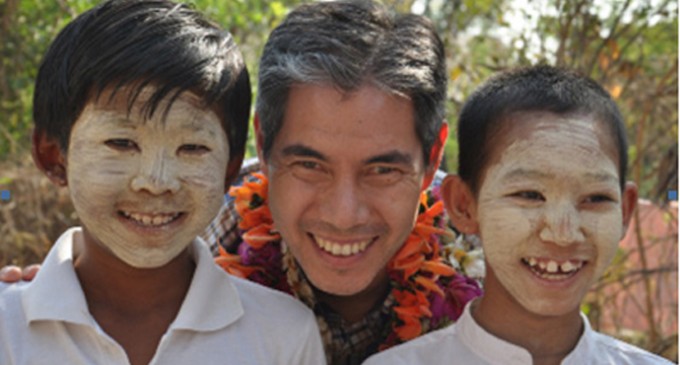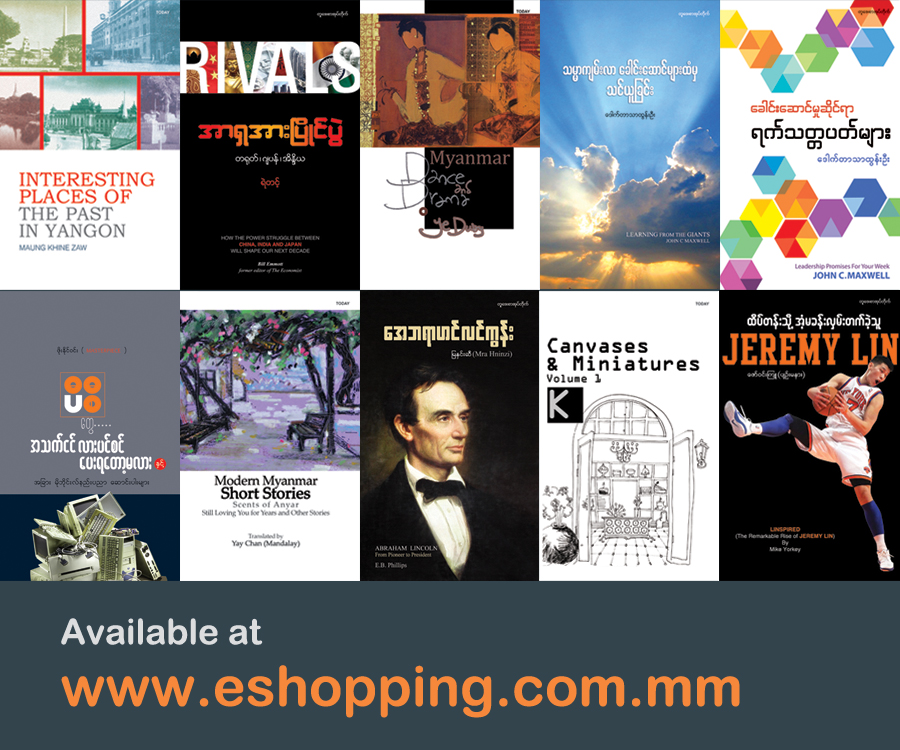INTERVIEW WITH CHRISTOPHER P. HERINK, National Director of World Vision Myanmar

World Vision is an international non-governmental organization (NGO), focused on improving the social and economic welfare of the most vulnerable people in Myanmar. Operating in the country since 1959, Yangon-based World Vision now has 129 projects underway in 11 states and regions. TODAY interviews World Vision’s Christopher P. Herink, learning about his work and life in Myanmar.
My name is Christopher P. Herink, but I’m known as Chris. I am married with two sons. All of my family is now residing in Myanmar.
Please elaborate on your work and activities . . .
I joined World Vision since 1999. I started my career as a history teacher at an international School in Hong Kong. I had the opportunity to travel to emerging Asian countries such as like India, Indonesia, realizing the importance of education to transform societies. In order to learn more, I went to graduate school, earning a degree in Educational Policy and Planning from Harvard University. Afterwards, I worked for a local NGO in India, where many children had no schooling for lack of money, distance, inadequate facilities, and prejudice against girls. In such an environment, community-based schools_sometimes known as non-formal education _ can allow children to learn basic reading and writing. As in India, non-formal education provides an important way for Myanmar children to continue their learning, outside of the state school system. From India, I started an NGO in Pakistan, which adapted educational TV shows for broadcast. One of the shows we adapted was Sesame Street. It was fun to see Big Bird speaking Urdu!
Your different official positions at World Vision please
My first job with World Vision was based in Washington DC. I was a Program Officer, covering a number of countries in Asia. After three years, I moved to Vietnam, where I worked as the Program Director for three years. I left World Vision for a number of years, working for the Red Cross. In 2007, I returned to World Vision to serve as the Regional Director for Asia, the Middle East, and Eastern Europe. Since July of 2010, I have been working in Myanmar as the National Director of World Vision Myanmar.
How long do you hope to work in Myanmar?
I am enjoying work and life in Myanmar immensely, especially at this important time in the country’s history. I hope to work in the country for a couple of more years.
Out of the countries where you have worked, which country do you prefer?
As I am living in Myanmar, I should say Myanmar! Honestly, I am very attracted to the friendliness, resilience, and community spirit of the Myanmar people.
What are the common difficulties to be met with in working in Myanmar?
I think that travel around the country is difficult, particularly to remote and border areas. The poor infrastructure makes it hard to reach needy places. I also think the low investment in health and education _ both from domestic and international source _ is a big challenge to universal access. The quality of health and education services could also use improvement. Even so, we find willing partners at all levels of the country, with different ministries, and with community-based organizations.
Your branches and strength of personnel in Myanmar please?
There are 35 offices, 845 staff and 3200 volunteers.
What do you think about your current Myanmar staff?
We have a number of technical staff members, including doctors, engineers, school teachers, and other professionals. We are grateful to have such skilled and committed staff members. Additionally, World Vision relies on a network of community volunteers, who mobilize community participation, deliver technical capacity building, and document impact. We know that we can multiply our efforts by engaging community volunteers.
How do you go about smooth management?
Our organization has different divisions_ for example, Finance, Human Resources, Operations, and Disaster Response. But we are all united in a common purpose of serving vulnerable children in Myanmar. Sometimes our organization has to work with government agencies as well as non-government communi-ties. Success means effective collaboration with clear results.
Currently, is World Vision set to give aid to Kachin and Rakhine?
It is not possible for us to cover the whole of Myanmar. Since there are other organizations offering assistance in Rakhine, we have decided to focus our support to displaced people in Kachin State. We have worked in Kachin State since 2008 and we are currently assisting people in 14 camps in Waimaw Township.
What HIV programmes are being imple-mented?
We focus on HIV prevention, care, and support activities. We try and target the people and communities which are most vulnerable _for example, those who are along transportation routes or those who are migrants. One of the best things we do is to establish peer support groups, which help those who are affected by HIV and which serve to prevent additional infections through peer education. In addition, we have active TB and malaria programs.
In which time of the year do you take trips locally?
I travel whenever I can. I have been to about 25 towns and cities such as Myeik, Kawthoung, Thanbyuzayat, Hpa-an, Mawlamyine, Pathein, Myaungmya, Yenangyoung, Chauk, Mandalay and Tachileik. I have plan to go to Thabaung, Kokant, and Tiddim in the early part of 2013. The diversity of Myanmar is stunning. There is so much to see and learn!
May we know world vision’s aims for 2013?
We will continue to support activities in education, particularly early childhood development for children age 3 to 5 years. We will also work to help farmers with improved seeds, fertilizers, planting techniques and access to credit. Micro finance is an area of significant growth, given the new law passed in November 2011. We will also be working with communities and the government on disaster preparedness.

How does your former stint as school-teacher help your present activities?
One of my jobs is to communicate to others what World Vision is doing, how we are doing it, and what are the results. In this, I view myself as an educator, always looking for interesting and effective ways to connect with others.
If chance permits, would you become a teacher again?
I would. I think one of the greatest qualities a person can have is curiosity. I am always trying to learn new things, and I’m keen to share with others too.
What do you get to do on holidays?
I enjoy swimming, cycling, and running. I would like to be more consistent in my exercise, but any sweaty day is a good day!
Some with advancing age, some would stop travelling. What about you?
There are so many interesting places in the world, so I cannot imagine staying in one place. Therefore, whatever my age, I think I will always look forward to travelling.
Any unforgettable experiences during a domestic travel?
We took a wonderful family trip from Lashio to Hsipaw to Pyin Oo Lwin to Mandalay. This included taking the train over the Goitek viaduct. On another trip a few months ago, my family and I hiked from Kalaw to Inle Lake. Its very special to be walking in such beautiful countryside.
What if a friend asked you about major characteristics of a Myanmar . . .
I really respect the unselfishness of the Myanmar people. It always seems that people are thinking about others before themselves. I think this is wonderful foundation for a person, community, and a country.
What about the country?
Myanmar has amazing geographic diversity, with its long coastline, high mountains in the north, and great rivers. It is also wonderfully situated, having borders with Bangladesh, India, China, Laos and Thailand. Myanmar has it all!
Your view on Myanmar’s communications please?
Communications is much better than in the past, and will hopefully get better in the future. Internet access and speed is still slow. Phone calls are still expensive. And SIM cards, though going down in prices, are still not acce-ssible to most people.
Did you get to return to your place of birth for a while?
I returned last past summer. When I came back to Myanmar. I felt like returning to a home. The chance to reside here is a blessing to me.
./wp-content/uploads/2018/10/Emirate-Online-TDY.png)


















There are no comments at the moment, do you want to add one?
Write a comment